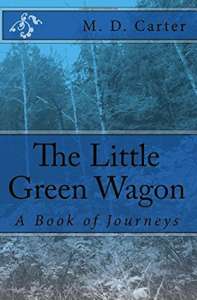
Homelessness is often the result of a long series of mishaps and misfortunes; M. D. Carter, author of The Little Green Wagon: A Book of Journeys, chose homelessness as a way of encountering the verities of life.
Struggling with addiction in his early twenties, alienated and alone, Carter thought of suicide as his only solution. In an intoxicated state he attempted to end his life by carbon monoxide poisoning; when that proved slow and unpleasant, he slashed his wrists and drove his car into a guardrail. He woke up, he recalls, wracked with pain, frustration and regret.
After problems with the law, Carter met two charming and equally dissolute male companions with whom he began to wander – south for the winter, staying a few days or weeks in one place, moving on, cadging funds for the onward journey in whatever way possible. Along highways, through woods, across America they journeyed. At one point, seeking a place to camp, a young girl in the doorway of a rundown house in the backwoods vowed to shoot them if they came any closer; later, that young woman, Amy, became the author’s wife.
Traveling with Amy, Carter’s inclination towards footloose rambling gradually crystallized into a lifestyle, then a sincerely held credo. As the couple roamed, they assayed many of America’s famous trails – the Appalachian, the Santa Fé, the Natchez Trace – savoring the cultures of its great cities. He worked as a dishwasher, she as a waitress, most often in Waffle House diners where they might be hired with few questions asked.
They also loped along unmapped back roads, anywhere their sense of adventure led them, occasionally with ostensible purpose, to visit a relative perhaps, but just as likely, simply to be there. Having no children, they “adopted” dogs. And always they helped homeless people more needy than themselves. These stories give the book a great sense of adventure, as well as a window into Carter’s charity. The book not only acts as a memoir about his experiences, but something of a manifesto about a way of life.
Carter, an autodidact who studied Greek philosophy and Christian religion as he traveled, has devised a moral code that includes assisting other downtrodden folk and judging local church and aid groups by what help they are willing to offer. The help he and Amy needed could include a ride, a bit of cash, temporary accommodation or employment. Though many held back, there were plenty of ordinary people who helped unasked, spontaneously. Core to Carter’s story is how he was looked upon by strangers, which is sometimes dispiriting, but just as often uplifting.
The tales Carter tells are entertaining, if sometimes distressing. He eschews chronology; a certain “beat” zeitgeist hovers over his vivid stream-of-consciousness style. At times his stance regarding his chosen, Thoreau-like isolation seems combative and needlessly scornful of those who may not sympathize absolutely with his position. He’s truly walked the walk, however, so his passion for his lifestyle comes with great authority, and will be of special value for those looking towards a more vagabond existence, and what that might entail.
For those readers who couldn’t conceive of undertaking this way of life, Carter’s stories are illuminating and well-told. Cumulatively, The Little Green Wagon is a thought-provoking read that sheds an important light on homelessness in America. Carter challenges common assumptions about homelessness, invoking a plea to common charity and openness, which is a vital message for any reader to absorb.
Links
Author Site
Facebook
Twitter
Amazon
Goodreads
STAR RATING
Design
Content
Editing
Get an Editorial Review | Get Amazon Sales & Reviews | Get Edited | Get Beta Readers | Enter the SPR Book Awards | Other Marketing Services























Leave A Comment